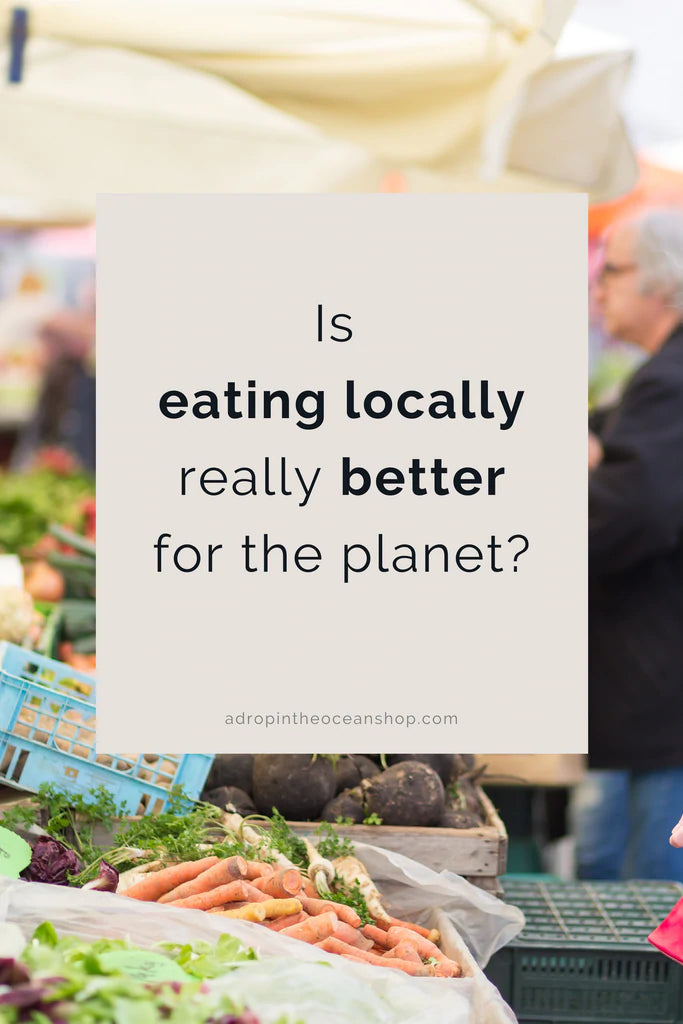Is eating locally actually better for the planet?

Hey there, friend!
Another week has come and gone. I hope that you are still safe and healthy and practicing some great social distancing. I don’t know about you, but I’ve gotten so much more familiar with video chatting tools than I ever thought I would, especially as an introvert. But hey, even introverts need our people.
I’d like to start this week's email with a bit of vulnerability.
I have gone back and forth more times than I can count about how I want to show up for you in these weekly emails.
Is it insensitive to continue talking about waste during a pandemic? Or do we need a sense of normalcy in this time?
I keep coming back to normalcy. I do believe it is important to stay informed about what is happening, but I, personally, know that I need a mental break from it all sometimes.
I would like to be that mental break for you. I know that talking about sustainability isn’t exactly the most fun of topics for a mental break moment, but it’s a piece of normalcy in a completely abnormal world.
So, friend, I plan to continue showing up in your inbox each Monday evening. Some days it may be a helpful tip, some days it may be a fun announcement, some days it may just be a reflection. But that’s what I want this community to be. I want us to share. To come together in difficult times and come out stronger.
And I am so glad you’re here.
So let’s dive into this week’s topic - eating locally.
Does eating locally have a lower carbon footprint?
First, I’d like to debunk a common argument in favor of eating locally - a reduced carbon footprint.
This argument, conceptually, makes sense. If food travels a shorter distance to your plate, it has less of a carbon footprint. But when I was researching this question during my Master’s program, my findings were surprising.
The average semi-truck has a fuel efficiency of about 6 MPG (Lutsey, 2015). However, when we consider the volume of food that can be transported on that one truck, and especially when we consider technology advancements that improve that fuel efficiency and sustainable energy sourcing, the overall footprint of the produce on that truck may actually be less than individual families traveling outside of their communities to various farms for their weekly produce (Peterson, 2013).
Let’s also consider climates that aren’t conducive to farming, or to farming a variety of produce. In order to grow enough of, and a variety of, produce, greenhouses may be built and pull greater amounts of energy (Berry, 2007; Peterson, 2013), and pesticides and insecticides may be used in higher amounts.
I say all of this not to discourage you from choosing locally-grown options, friend, but to demonstrate that nothing is a perfect solution.

So why eat locally?
Eating locally has a myriad of benefits. For one, eating locally typically involves eating more whole foods, which we all know leads to a healthier body and lifestyle.
And - this one hit me - 29% of the energy consumed in food production occurs in the processing steps (Peterson, 2013). If we consume more whole foods, there are fewer production costs and less wasted energy upstream.
Arguably most important, though, is eating locally supports our community and local economy. We are advocating to support our farmers, reinvesting into our community and local businesses, and preserving local jobs (seasonalfoodguide.org).
Especially in a time like we find ourselves in now, these are all critical to fostering a resilient community and economy.
How do I know what is in season where I live?
I recently came across this great website, the Seasonal Food Guide. Choose your state and either the season or the food, and find exactly what is in season for you, and when.
In Washington right now, asparagus just came into season and I was so excited I got four bunches in my Imperfect Foods delivery last week (please send asparagus recipes).
Maybe you can’t make a whole meal using only fresh, local, in-season ingredients. If you can, please send me all the recipes! But, for example, maybe choosing asparagus instead of broccoli as your side dish this month is feasible for you.
Is there just one swap you can make for a local option?
Check out my new favorite book, Animal, Vegetable, Miracle by Barbara Kingsolver.
I laughed, I cried, I couldn't put it down.
I feel much the same about eating locally as I do eating organic (if you didn’t read the post from two weeks ago, it’s worth a skim, at least). The values associated with eating locally are some that I choose to live by - supporting small business, supporting local business, and eating well.
And if you’re interested in diving into this topic a little bit more, Zooey Deschanel has a wonderful video on eating locally, and vertical gardens. Definitely worth the 5 minute watch! I revisit this video on the reg.
Now, friend, I have just one question left for you.
What is one food you absolutely cannot wait to come into season? Share it in the comments!
For me, it’s strawberries. And blackberries. And raspberries. Just send all the berries my way, pleaseandthankyou.
Sources:
Berry, C. (2007). Buying, Eating, and Acting Locally. Appalachian Journal, 385-389.
Lutsey, N. (2015 April 21). Eighteen wheels and ten miles per gallon. The International Council on Clean Transportation. Retrieved from https://www.theicct.org/blogs/staff/eighteen-wheels-and-ten-miles-gallon.
Peterson, G. R. (2013). Is Eating Locally a Moral Obligation? Journal of Agricultural and Environmental Ethics, 26, 421-437.
Related:
Closed-Loop Landscaping: Have Your Yard and Eat It Too with Foodscaping









Leave a comment